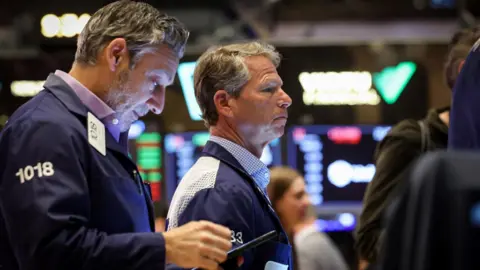Markets mixed as investors brace for Trump tariffs
 Reuters
ReutersShares in the US have bounced back, despite tariff fears hitting stocks in Asia and Europe after US President Donald Trump suggested that he was planning import taxes that could hit "all countries".
Trump's comments came as he prepares to unveil a massive slate of import taxes on Wednesday, in what he has called America's "Liberation Day".
These will come on top of Trump's recent import taxes on aluminium, steel and cars, along with increased levies on all goods from China.
The tougher stance from Trump has increased nervousness about a trade war hitting the global economy.
Trump has offered conflicting signals about the scope of the expected tariffs, which have helped drive steep declines in the US stock market over the last month.
Last week, he had raised the possibility that many countries could receive "breaks". But over the weekend, he appeared to be leaning toward a more wide-ranging plan.
"You'd start with all countries," Trump told reporters on Air Force One on Sunday. "Essentially all of the countries that we're talking about."
The UK has said it expects to be affected by US tariffs and is not ruling out retaliating.
The prime minister's official spokesman has said talks on an economic deal between the two countries have been "constructive", but are likely to last beyond Wednesday.
Other jurisdictions, such as the European Union and Canada, have already said that they are preparing a range of retaliatory trade measures.
Concerns about the impact of the measures have unsettled markets and reignited fears of a recession in the US.
In the US, the S&P 500 share index of the largest firms has fallen almost 10% since mid-February, making March the worst month for the index in years.
The Nasdaq is down more than 10%, its worst quarter since 2022.
With significant uncertainty remaining about the 2 April announcement, shares in the US opened lower but ultimately held their ground on Monday.
The Dow closed up 1%, while the S&P ended up 0.5% and the Nasdaq slipped just 0.1%.
Earlier on Monday, Japan's Nikkei 225 benchmark share index closed more than 4% lower, while the Kospi in South Korea ended down 3%.
In the UK, the FTSE 100 index fell nearly 0.9%, while Germany's Dax index closed down nearly 1.3% and France's Cac 40 fell roughly 1.6%.
Gold, which is often seen as a safer investment when the economic backdrop is unstable, rose to another record high, hitting $3,128.06 an ounce.
Shanti Kelemen, chief investment officer at M&G Wealth, told the BBC there could be "quite a lot of uncertainty" for a while given that previous tariff announcements have seen a lot of changes subsequently.
Japan, which is a big player in exports, is among those countries most at risk from the changes, Ms Keleman said.
"They have a lot of automakers and also a very big presence in the semiconductor market, something that hasn't really been targeted yet but that could change," she noted.
3 million US jobs?
Trump sees tariffs - which are taxes imports - as a bargaining chip to get better trade terms, while also raising money and protecting the American economy from unfair competition.
A White House fact sheet published last week also suggested that a 10% tariff on every import could create nearly three million US jobs.
Trump trade adviser Peter Navarro has estimated that all the planned tariffs could raise $600bn annually, about a fifth of the value of total goods imports into the US.
Many firms have said they expect the cost of the new tax to be passed onto customers in the form of higher prices.
But that could lead to lower sales and fuel inflation in the US, a problem Trump had pledged on the campaign to tackle.
Conversely, if companies decide to absorb the cost, it will hit their profits.
'Counter-productive'
 Getty Images
Getty ImagesWill Butler-Adams is chief executive of Brompton Bicycle, which makes folding bikes and relies on the US for about 10% of its sales.
Brompton's products are not facing additional taxes yet.
But Mr Butler-Adams said tariffs would make his bikes less competitive and force him to re-think his presence in the US.
"We won't continue to invest in the same way that we are now," he said. "We may even shrink; in the extreme, we might pull out."
Mr Butler-Adams said it had been hard to figure out the impact of tariffs that have already gone into effect, which require detailed accounting of how much steel in each item comes from outside the US.
"The reality is we don't [know] actually and the people who are on the borders importing goods into the US don't actually entirely understand how some of these tariffs might be put in," Mr Butler-Adams said.
TikTok sale
Separately, Trump said a deal with TikTok's Chinese owner ByteDance to sell the app would be agreed before a deadline on Saturday.
He set the 5 April deadline in January for the short video platform to find a non-Chinese buyer or face a ban in the US on national security grounds.
It had been due to take effect that month to comply with a law passed under the Biden administration.
Additional reporting by Dearbail Jordan and Mitchell Labiak
